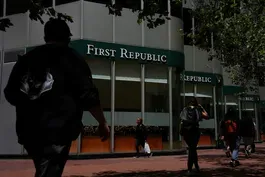
Idaho abortion laws create uncertainty for OB-GYNs
Clip: 5/1/2023 | 9m 41sVideo has Closed Captions
Idaho's strict abortion laws create uncertainty for OB-GYNs in the state
Since the Supreme Court overturned Roe v. Wade last year, 14 states have banned abortions in nearly all cases. Many maternal health doctors say state abortion bans are untenable and OB-GYNs are beginning to pack up and leave. In a segment co-produced with the PBS NewsHour, KFF Health News correspondent Sarah Varney reports on this growing crisis.
Problems with Closed Captions? Closed Captioning Feedback
Problems with Closed Captions? Closed Captioning Feedback
Major corporate funding for the PBS News Hour is provided by BDO, BNSF, Consumer Cellular, American Cruise Lines, and Raymond James. Funding for the PBS NewsHour Weekend is provided by...

Idaho abortion laws create uncertainty for OB-GYNs
Clip: 5/1/2023 | 9m 41sVideo has Closed Captions
Since the Supreme Court overturned Roe v. Wade last year, 14 states have banned abortions in nearly all cases. Many maternal health doctors say state abortion bans are untenable and OB-GYNs are beginning to pack up and leave. In a segment co-produced with the PBS NewsHour, KFF Health News correspondent Sarah Varney reports on this growing crisis.
Problems with Closed Captions? Closed Captioning Feedback
How to Watch PBS News Hour
PBS News Hour is available to stream on pbs.org and the free PBS App, available on iPhone, Apple TV, Android TV, Android smartphones, Amazon Fire TV, Amazon Fire Tablet, Roku, Samsung Smart TV, and Vizio.
Providing Support for PBS.org
Learn Moreabout PBS online sponsorshipAMNA NAWAZ: Since the Supreme Court overturned Roe v. Wade last year, 14 states have banned abortions in nearly all cases.
Many maternal health doctors say state abortion bans are untenable for them and their patients.
From Tennessee to Texas to Idaho, OB-GYNs are beginning to pack up and leave.
In a segment co-produced with the "PBS NewsHour," KFF Health News correspondent Sarah Varney reports on this growing crisis.
SARAH VARNEY: Over beers at a local Sandpoint, Idaho, brewery, residents held a wake of sorts... WOMAN: My fellow doctors, my nurse anesthetist, you have been a family to me for 14 years.
SARAH VARNEY: ... to mourn the closure of the labor and delivery ward at Bonner General, the city's only hospital.
The hospital in part blamed Idaho's legal and political climate.
Quote: "Highly respected, talented physicians are leaving.
Recruiting replacements will be extraordinarily difficult."
The closure comes just eight months after Idaho's abortion ban went into effect.
Except in cases of police-reported rape and incest, physicians can only perform the procedure to -- quote -- "prevent the death of a pregnant woman."
DR. AMELIA HUNTSBERGER, Bonner General: One of the most strict fans across the country.
SARAH VARNEY: Dr. AMELIA HUNTSBERGER has delivered babies and treated miscarriages at Bonner General for more than a decade.
But soon after abortion became illegal here, she saw a patient with a ruptured ectopic pregnancy, a fertilized egg that grows outside the uterus.
DR. AMELIA HUNTSBERGER: We needed to move quickly to stabilize her and save a life.
When I got to the operating room and I removed the ectopic pregnancy, which at that point was problematic legally, I knew that I needed to do what my oath requires me to do, to prioritize the safety of my patient.
And I also knew that I was putting myself, theoretically, potentially, at risk of felony charges, which would have a minimum of two years in jail, loss of my medical license for six months.
SARAH VARNEY: Dr. Huntsberger and her family have decided to leave Idaho.
DR. AMELIA HUNTSBERGER: This isn't a safe place to practice medicine anymore.
SARAH VARNEY: The law has since been amended to allow for terminating ectopic or molar pregnancies, a rare complication caused by an unusual growth of cells.
But Dr. Huntsberger says it still doesn't account for many common pregnancy complications that can escalate quickly.
DR. AMELIA HUNTSBERGER: For instance, there's something called an inevitable abortion, meaning the cervix is open, the pregnancy is going to pass, but has not yet.
You could have a woman bleeding heavily, and yet there still might be a heartbeat.
When is it OK for me to act?
Can I just say this, without treatment, is really, really risking her life and I should act now?
Or do I wait until she bleeds out?
Do I wait until we do CPR?
When is it that I can intervene?
How close to death does she need to be before I take care of her in the way that I trained for years to know how to do?
STATE REP. MARK SAUTER (R-ID): Hope is kind of at the base with those mountains, the mountains with snow on them.
SARAH VARNEY: OK. State Representative Mark Sauter, a Republican, lives in Sandpoint.
He says he hadn't thought much about the abortion ban.
STATE REP. MARK SAUTER: It really wasn't high on my radar, other than I'm a pro-life guy, and I ran that way, but I didn't see it as it had a real -- having a real big community impact.
SARAH VARNEY: Then he started talking with local doctors, including Amelia Huntsberger.
What I'm wondering is, for you personally, did you think about abortion as it relates to obstetric care for pregnant women?
STATE REP. MARK SAUTER: No, I don't think I -- it's like anything.
You get exposed to something and, all of a sudden, you go, wow, there's a different way to look at this.
You know, what are we going to do about all this?
So, is Bonner the canary in a cold line in the coal mine?
STATE REP. MARK SAUTER: It could be.
SARAH VARNEY: With Sandpoint's maternity ward closing, Representative Sauter supported a bill that would have allowed doctors to terminate pregnancies to protect a woman's health, not just prevent her death.
But that effort was shot down by other Republicans.
STATE REP. JULIANNE YOUNG (R-ID): The list was endless when we began considering the conditions that could fall under that language.
We want to make sure that health of the mother doesn't become so broad that everything becomes an exception to take the life of a potential child.
DR. AMELIA HUNTSBERGER: I think it sends a really powerful message to the citizens of Idaho, that the legislature doesn't think that the protection of the health of pregnant patients is important.
SARAH VARNEY: Far to the south, in Boise, Dr. Lauren Miller resigned from her position at Idaho's largest hospital last month.
She's been forced to send patients out of state to end dangerous pregnancies, including a woman with a serious kidney disease.
DR. LAUREN MILLER, Maternal Fetal Medicine Specialist, St. Luke's: I could very easily have taken care of that patient, along with my partners.
We have the team on the ground.
We have the kidney specialists.
We have the intensive care unit.
But, instead, she had to leave her family and fly several more hours away to receive care in an expeditious time frame.
It's just not what we signed up to do.
SARAH VARNEY: You have been working under this, these laws for many months now.
Why now?
Why did you decide to resign?
DR. LAUREN MILLER: Yes, it's no one single factor.
It's kind of the conglomeration of all of the legislation that has been passed this session.
SARAH VARNEY: On top of the abortion ban she blames lawmakers for failing to extend postpartum Medicaid coverage and failing to reauthorize a committee of experts that investigates pregnancy-related deaths.
A recent survey found that about 40 percent of Idaho's OB-GYNs are considering leaving the state.
That will affect women who rely on OB-GYNs for routine and urgent gynecological care unrelated to pregnancy, like menstrual disorders, endometriosis, and pelvic pain.
There's no official nationwide count yet, but OB-GYNs and maternal fetal medicine specialists from states across the country where abortion is criminalized are beginning to relocate to places like Washington state.
Here in Seattle, physicians can care for patients without fear of prosecution.
DR. SARAH VILLARREAL, University of Washington School of Medicine: Is there anyone that you're worried about on the afternoon schedule?
SARAH VARNEY: Dr. Sarah Villarreal is an OB-GYN who moved to Washington state last summer from Texas.
There, she had to practice under a state law that allows private citizens to file civil lawsuits and earn at least $10,000 against anyone who aids or abets an abortion.
In Texas, performing an abortion is a felony punishable by up to life in prison.
DR. SARAH VILLARREAL: Even if we do nothing, even if someone just accused me of breaking the law, and I had not actually done anything wrong, I could still have to go through the court system and go to court.
SARAH VARNEY: She says there's an atmosphere of fear and distrust at many Texas hospitals.
DR. SARAH VILLARREAL: I had a patient who I saw in the emergency room who was actively having a miscarriage, and the fetus still had a heartbeat.
And it was a desired pregnancy.
But, at that point, she was losing a lot of blood, to the point that we were worried that it was going to be threatening to her life.
She was trying to figure out if me, as the provider, was going to report her for -- if she did decide that she wanted to do a D&C procedure to save her life over the life of her fetus versus asking me questions about her own health care.
SARAH VARNEY: Even medical students are beginning to change their plans.
This year, applicants to OB-GYN residency programs decreased by 10.5 percent in states with total abortion bans.
And those pursuing other disciplines are taking notice too.
Kathryn Tiger and Allie Ward, first-year medical students in Moscow, Idaho, are planning to become surgeons.
They spoke to "NewsHour" in their personal capacities.
Do you imagine yourselves ever being able to work here in Idaho?
KATHRYN TIGER, Medical Student: I personally don't.
And I wouldn't feel safe here as a provider and I wouldn't feel safe here as a patient.
SARAH VARNEY: So you're not planning on pursuing OB-GYN?
Why do you think that these laws will affect you?
ALLIE WARD, Medical Student: Medicine in general is such an interdisciplinary capacity, and you have to be able to refer and collaborate.
It's terrifying to think that I wouldn't be able to refer a patient who was seeking care or even just education to a colleague of mine that I trusted because of the laws in place.
DR. AMELIA HUNTSBERGER: How far can you throw it?
SARAH VARNEY: Back in Sandpoint, Dr. Amelia Huntsberger and her family are saying their goodbyes to Idaho.
DR. AMELIA HUNTSBERGER: And so it's heartbreaking to me to think about what it will mean for a woman experiencing a pregnancy crisis,a pregnancy complication, an emergency who will now be many miles away from an OB-GYN, many miles away from a facility that has the staff to stabilize her.
SARAH VARNEY: Sandpoint isn't the only city in Idaho to lose a labor and delivery ward.
A hospital in Emmett north of Boise recently announced that it too will stop providing services for expecting mothers.
For the "PBS NewsHour" and KFF Health News, I'm Sarah Varney in Sandpoint, Idaho.
Americans rescued from war-torn Sudan as crisis worsens
Video has Closed Captions
Hundreds of Americans rescued from war-torn Sudan as crisis reaches breaking point (5m 2s)
Arabic music finds new audience with streaming, social media
Video has Closed Captions
Arabic music breaks through to new audiences with help of streaming and social media (1m 47s)
Economic concerns grow as 3rd major bank fails this year
Video has Closed Captions
Economic concerns grow as First Republic Bank becomes 3rd major bank to fail this year (5m 38s)
Hollywood writers' strike could halt film, TV production
Video has Closed Captions
The issues behind possible Hollywood writers' strike that could halt film, TV production (7m)
New book explores culture surrounding guns in America
Video has Closed Captions
New book 'Merchants of the Right' explores culture surrounding guns in America (7m 11s)
News Wrap: Manhunt for Texas man accused of killing 5
Video has Closed Captions
News Wrap: Intense manhunt continues for Texas man accused of killing 5 neighbors (8m 14s)
Trump trial and legal accountability in sexual assault cases
Video has Closed Captions
What the Trump civil trial could mean for legal accountability in sexual violence cases (6m 27s)
Providing Support for PBS.org
Learn Moreabout PBS online sponsorshipSupport for PBS provided by:
Major corporate funding for the PBS News Hour is provided by BDO, BNSF, Consumer Cellular, American Cruise Lines, and Raymond James. Funding for the PBS NewsHour Weekend is provided by...


















